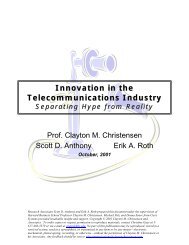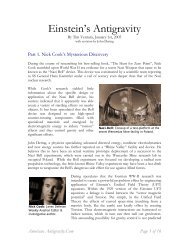A world of connections - Signal Lake Venture Fund
A world of connections - Signal Lake Venture Fund
A world of connections - Signal Lake Venture Fund
Create successful ePaper yourself
Turn your PDF publications into a flip-book with our unique Google optimized e-Paper software.
But companies are beginning to show<br />
interest in the sector. Adi Gan <strong>of</strong> Evergreen<br />
<strong>Venture</strong> Partners, a venture-capital fund in<br />
Israel, says that numerous business plans in<br />
this area have crossed his desk in recent<br />
months. He sees a lot <strong>of</strong> promise. For<br />
example, a doctor might implant a sensor<br />
during surgery to <strong>of</strong>fer far better postoperative<br />
monitoring and care. When the<br />
patient comes for a follow-up visit, the<br />
doctor's reader would power the chip, which<br />
would provide medical information. Tiny<br />
devices could even be used for treating<br />
diseases. They might be powered wirelessly<br />
to, say, burn new cancer cells in an area that<br />
had previously been treated.<br />
Belle Mellor<br />
Such uses <strong>of</strong> wireless seem far removed from<br />
the mobile phones which vast numbers <strong>of</strong><br />
people carry with them at all times. But there<br />
is a connection. As the use <strong>of</strong> wireless<br />
medical devices grows, the best way <strong>of</strong> collecting the data and sending them to a<br />
remote monitoring centre may turn out to be the patient's mobile phone, which will<br />
be close enough to receive data from the low-powered implanted device. It could be<br />
the critical bit <strong>of</strong> infrastructure between wireless communications in the body and the<br />
global internet. Just when people are starting to think <strong>of</strong> the mobile phone as a<br />
wallet, they find that it is becoming the family doctor too.<br />
Mobile-phone operators understand the potential. South Korean and Japanese<br />
carriers are experimenting with technologies that let people monitor their heart rate,<br />
blood pressure and other vital signs with home devices and transmit the data using a<br />
phone. Philips and GE are adding wireless technology to patients' home-monitoring<br />
devices. Yet today's mobile networks are not sufficiently reliable for anything other<br />
than non-critical uses, according to a study in 2005 from the University <strong>of</strong><br />
Massachusetts in Amherst. And the operators' current pricing models are a major<br />
barrier, says Matt Welsh <strong>of</strong> Harvard University, who is developing sensors for the<br />
continuous monitoring <strong>of</strong> vital signs.<br />
For now the advances are largely coming from the IT industry, not the medical<br />
sector, which is noted for its conservatism. Whereas pharmaceutical firms are<br />
starting to use RFID tags on medicine packages as an anti-counterfeiting measure,<br />
other companies are working to put RFID tags onto individual pills. In January Kodak<br />
filed for a patent on an edible RFID tag which could be used, for example, to<br />
examine the digestive tract or check whether a patent has taken his medication.<br />
It all seems a long way from the Baja Beach Club, where Mr Chase goes about his<br />
nightly routine. He reviews images from security cameras, some <strong>of</strong> which are<br />
wireless, and then locks an <strong>of</strong>fice with keys using a wireless ID system that records<br />
who enters where and when. The geeky stuff is his doing, but then he has form.<br />
Back in the 1980s, long before opening his nightclub, he served in the US Army<br />
<strong>Signal</strong> Corps, working on the ARPANET, the military precursor to the internet.





